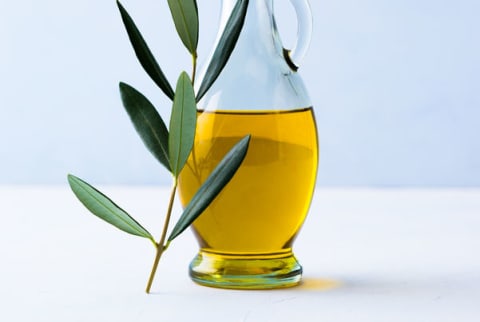Advertisement
A Brain Health Expert Wants You To Stop Cooking With This Type Of Olive Oil


If the term unfiltered slapped on the front of a food label leads you to assume it's healthier, you're not the only one. And at times this may even be true; take fruit juice, for example. Fresh-squeezed juice generally has more fiber and no added sugar, making it a healthier option. As much as this concept may be true for some items, it's not necessarily the case when it comes to olive oil—or shall we say cooking with olive oil.
On a recent episode of the mindbodygreen podcast, we sat down with Max Lugavere, a health and science journalist and New York Times bestselling author. We dove deep into the topic of brain-supporting foods, which is the focus of his new book, Genius Kitchen. Lugavere shared his personal day-to-day menu and some easy ways to up the amount of brain-loving foods in your diet. One tip we would be remiss to ignore: You shouldn't cook with unfiltered olive oil. Here, we'll explain why.
Why you shouldn't cook with unfiltered olive oil.
You may be wondering: What makes olive oil so brain-healthy in the first place? According to Lugavere, "Extra-virgin olive oil is, in my view, medicine for the brain. It's also a staple of the Mediterranean diet," which is commonly referred to as the best diet for brain health, thanks to its large amounts of antioxidants, phytosterols, and vitamins1. He uses it to cook all of his meals (minding the lower smoke point), but you can also toss it into sauces, desserts, and more. The important part is to make sure you're getting the right kind, which, according to Lugavere, is filtered extra-virgin olive oil (EVOO).
You might think unfiltered extra-virgin olive oil is the healthier option because it's, well, unfiltered. But in fact, there's a sneaky reason why Lugavere actually prefers filtered EVOO. "Unfiltered extra-virgin olive oil has [olive] remnants in the oil, which dramatically lowers its smoke point and also makes it more prone to degradation. Those olive remnants decrease the shelf life," Lugavere says.
Unfiltered olive oil also contains more water and sediment, both of which can accelerate the shelf life of the bottle. Unfiltered olive oil does have a higher polyphenol content, thanks to the freshly milled olive particles, so it technically is the more nutrient-dense option—but you would have to consume it pretty quickly before it goes rancid. It's similar to the fruit juice example we mentioned above: The shelf life of fresh-pressed juice is only two or three days. What's more, unfiltered olive oil may not be the best option for high-heat cooking since it degrades easily.
Filtered EVOO, on the other hand, is safe to cook with up to a temperature of about 350 or 375 degrees Fahrenheit, says Lugavere. And as a general rule of thumb: If the olive oil is going to stay moist throughout the process (like with an olive oil cake, for example), then you're probably safe to cook up to 400 degrees. Otherwise, keep the temperature lower for dry cooking.
The bottom line? Keep incorporating olive oil into all of your brain-healthy meals; just make sure you're cooking with filtered EVOO to keep the smoke point as high as possible. If you're interested in using olive oil to support brain health, daily supplements may be a good option as well. mbg's vitamin D3 potency+ contains a trio of organic oils—including Lugavere's go-to extra-virgin olive oil—to help chauffeur vitamin D so it's best absorbed by the body. On that note, vitamin D specifically serves as another building block to a healthy brain.* In fact, researchers found that vitamin D affects proper brain function, thus promoting balanced mood and cognitive function.*
So if you're looking for a brain-supporting supplement to complement your Mediterranean diet, vitamin D3 potency+ is a great option; better yet, our robust formula also provides unsaturated omega-3 and omega-9 fatty acids (over 400 milligrams in each gelcap!), as well as antioxidant and anti-inflammatory properties that can help further promote brain health.*
The takeaway.
Although the term unfiltered may sound attractive on the label, you should be mindful of how it can affect your olive oil. Specifically, unfiltered olive oil does not remove olive particles, water, and sediment, and that can actually lower the smoke point and make the oil more prone to degradation. All this means is that next time you shop, reach for filtered EVOO instead to make the most out of this brain food.
